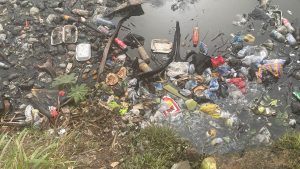Plastic waste is a growing environmental concern in Ghana, and its impact on aquaculture cannot be overemphasized. The aquatic ecosystem plays a significant role in the Ghanaian economy, as the fishing industry provides employment opportunities and contributes to the country’s food security. However, plastic waste poses a significant risk to the aquatic ecosystem, leading to adverse effects on aquatic life and the environment. In this article, we will explore the impact of plastic waste on aquaculture in Ghana and propose practical solutions to address this issue.
Plastic waste has become a ubiquitous problem in Ghana, with an estimated 2.7 million tons of plastic waste generated annually. The majority of this waste ends up in water bodies, causing a severe threat to aquatic life. In Ghana, the effects of plastic waste on aquaculture have been significant. The use of plastic bags for packaging fish and other seafood has become prevalent, leading to an increase in plastic waste in water bodies. This waste poses a threat to fish and other aquatic animals, leading to reduced growth rates, reproductive success, and even death.
According to a study conducted by the United Nations Development Programme (UNDP) in 2019, Ghana loses approximately $290 million annually due to plastic waste pollution. The study revealed that plastic waste pollution causes severe damage to the environment, leading to adverse effects on health, tourism, and agriculture. The impact of plastic waste on aquaculture is a significant concern, as it can lead to the contamination of fish and other seafood, reducing their market value.
Furthermore, plastic waste has a negative economic impact on fish farmers in Ghana. The accumulation of plastic waste in water bodies can lead to reduced oxygen levels, affecting the quality of water and fish. This can result in lower yields and reduced income for fish farmers. Additionally, the cost of managing plastic waste can be a significant burden on small-scale fish farmers, who may not have the resources to invest in proper waste management techniques.
To address this issue, there is a need for practical solutions that can reduce the impact of plastic waste on aquaculture in Ghana. One solution is to promote the use of eco-friendly packaging materials for fish and other seafood. The government can also implement policies that encourage proper disposal of plastic waste and promote recycling initiatives. Additionally, there is a need for public education on the effects of plastic waste on aquatic life and the importance of proper waste management.
Table 1: Estimated Annual Plastic Waste Generated in Ghana by Sector (in tons)
| Sector | Estimated Annual Plastic Waste (tons) |
|---|---|
| Household | 1,100,000 |
| Industrial | 1,200,000 |
| Commercial | 400,000 |
| Healthcare | 70,000 |
| Agriculture | 30,000 |
| Total | 2,800,000 |
Source: United Nations Development Programme (UNDP), 2019.

Plastic waste poses a significant threat to the aquatic ecosystem in Ghana, leading to adverse effects on aquatic life and the environment. The impact of plastic waste on aquaculture is a growing concern, as it can lead to reduced yields, lower income for fish farmers, and the contamination of fish and other seafood. Practical solutions, such as promoting eco-friendly packaging materials, implementing policies that encourage proper disposal of plastic waste, and public education, are necessary to address this issue.
